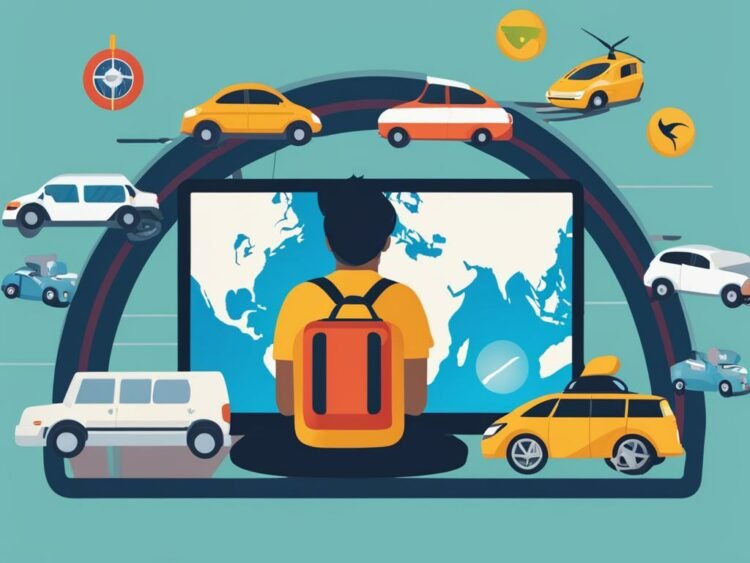The sharing economy has revolutionized the way we travel, offering smart options for accommodation and transportation. Platforms like Airbnb and Uber have transformed the traditional travel industry, providing individuals with affordable and convenient alternatives. Whether you are looking for a cozy home away from home or a hassle-free ride, the sharing economy has you covered.
With Airbnb, you can find unique and affordable accommodations around the world. From trendy apartments in city centers to cozy cottages in remote areas, there is something for every traveler’s taste and budget. Experience local culture and hospitality while enjoying the comforts of a home away from home.
Uber, on the other hand, offers a convenient and reliable way to get around in unfamiliar cities. Say goodbye to expensive taxis and confusing public transportation systems. With just a few taps on your smartphone, you can request a ride and be on your way to your destination in no time.
Embracing the sharing economy not only provides you with smart travel options but also contributes to a more sustainable economy. By utilizing under-utilized physical assets, such as spare rooms or empty car seats, the sharing economy promotes more efficient use of resources and reduces waste. It’s a win-win situation for both travelers and the environment.
Key Takeaways
- The sharing economy offers smart travel options through platforms like Airbnb and Uber.
- Platforms like Airbnb provide unique and affordable accommodations around the world.
- Uber offers a convenient and reliable way to get around in unfamiliar cities.
- The sharing economy promotes more efficient use of resources and contributes to a more sustainable economy.
- By embracing the sharing economy, you can experience local culture and hospitality while enjoying the comforts of a home away from home.
Understanding the Sharing Economy: Definition and Distinctions
The sharing economy is a thriving concept that revolves around consumer-to-consumer platforms, where individuals can provide temporary access to goods and services. Unlike the traditional product-service economy, which focuses on the transfer of ownership, the sharing economy emphasizes the temporary sharing of assets without the need for ownership exchange.
This distinction is crucial in understanding the essence of the sharing economy. Platforms like Airbnb and Peerby facilitate the sharing of physical goods, such as homes and personal belongings, enabling individuals to benefit from underutilized resources. On the other hand, platforms like Taskrabbit allow users to provide services to others, creating opportunities for a diverse range of skills to be shared within a community.
“The sharing economy involves granting temporary access to under-utilized physical assets, rather than renting or leasing.”
By engaging in the sharing economy, individuals have the chance to unlock the value of their possessions and skills, while also promoting sustainability and resource efficiency. The sharing economy encourages a collaborative approach to consumption and can contribute to a more sustainable and environmentally friendly economy.
Consumer-to-Consumer Platforms vs. the Product-Service Economy
It is important to distinguish the sharing economy from the product-service economy. In the product-service economy, consumers gain access to products while the service provider retains ownership. This model is typical of traditional businesses, where consumers purchase or lease products and services directly from companies.
In contrast, the sharing economy focuses on the temporary sharing of assets between individuals. It is not about merely transferring ownership or engaging in the second-hand economy. Instead, it enables individuals to connect and share resources, fostering a sense of community and mutual benefit.
- Consumer-to-consumer platforms enable individuals to provide temporary access to under-utilized physical assets.
- Product-service economy focuses on consumers gaining access to products while the service providers retain ownership.
- The sharing economy promotes resource efficiency and sustainability through collaborative consumption.

The sharing economy has witnessed remarkable growth in recent years, with projections indicating that the sector’s revenues could reach a staggering $335 billion by 2025. This rapid expansion is driven by the increasing popularity of sharing economy platforms across various sectors.
Sharing economy platforms have disrupted traditional industries, offering unique business models that cater to changing consumer needs. Sectors such as mobility, retail and consumer goods, tourism, entertainment, finance, energy, and human resources have prominently embraced the sharing economy. By providing innovative solutions and facilitating resource optimization, these platforms contribute to a more sustainable economy.
The future of the sharing economy lies in its ability to adapt to economic and social changes. Advanced digital platforms, economic rationality, and the evolving demands of consumers are key factors that will shape the growth and success of the sharing economy. It is crucial to understand the interdependency between sharing economy platforms and their demand interactions. For example, the relationship between Uber and Airbnb highlights the need for a comprehensive understanding of user preferences and market dynamics.
Sharing Economy Sectors
- Mobility: Ride-sharing platforms like Uber and Lyft have revolutionized the transportation industry, offering convenient and cost-effective alternatives to traditional taxis.
- Retail and Consumer Goods: Renting and sharing platforms such as Rent the Runway and Peerby enable consumers to access products without the need for ownership, promoting a more sustainable approach to consumption.
- Tourism: Airbnb has transformed the travel industry by allowing homeowners to rent out their space to travelers, offering unique and affordable accommodation options.
- Entertainment: Platforms like Netflix and Spotify provide access to a vast library of content, allowing users to enjoy movies, TV shows, and music without owning physical copies.
- Finance: Peer-to-peer lending platforms and crowdfunding sites have democratized access to financial services, allowing individuals to borrow and invest directly.
- Energy: Energy-sharing platforms enable individuals to share excess energy generated by solar panels, fostering a more sustainable and decentralized energy system (Need a reliable solar power? Bluetti coupon codes can help you save on your purchase).
- Human Resources: Freelancing platforms such as Upwork and Fiverr connect businesses with freelancers, facilitating flexible work arrangements and promoting remote work opportunities.
As the sharing economy continues to grow, it is essential to address concerns related to regulation, platform monopolies, privacy violations, and unfair competition. Responsible actions from sharing economy platforms and effective regulation are necessary to ensure its continued success and integration into various sectors.
Conclusion
In conclusion, the sharing economy offers smart travel options through platforms like Airbnb and Uber. This economic phenomenon promotes sustainable and efficient use of resources, leading to reduced energy consumption and less material waste. However, it also faces challenges such as regulation and concerns about unfair competition.
The growth of the sharing economy presents significant opportunities for various sectors, including mobility, retail and consumer goods, tourism, entertainment, finance, energy, and human resources. Sharing economy companies disrupt traditional industries with their unique business models, driven by advanced digital platforms, changing consumer needs, and social changes.
For the sharing economy to continue thriving, effective regulation is essential. Smart regulation, like the case study of Amsterdam, empowers users, ensures competition between platforms, and protects user data. Responsible actions from sharing economy platforms, such as cooperation with municipalities and adherence to regulations, are critical in addressing concerns and preventing negative consequences for local residents.
In summary, the sharing economy has transformed the way people travel and share resources. It offers sustainable and efficient alternatives to traditional travel options. However, to ensure its continued success, further understanding of demand interactions and responsible integration are necessary. With effective regulation and responsible actions, the sharing economy can contribute to a more sustainable and inclusive economy.
FAQ
What is the sharing economy?
The sharing economy is a significant social and economic phenomenon that involves people sharing their homes, cars, and rides through platforms like Airbnb, Uber, and BlaBlaCar. It is defined as consumers granting each other temporary access to under-utilized physical assets, rather than renting or leasing from a company.
What are the benefits of the sharing economy?
The sharing economy promotes more efficient use of physical assets, reduces energy consumption, and contributes to a more sustainable economy. It offers smart travel options and allows individuals to monetize their underutilized assets.
What are the concerns associated with the sharing economy?
Some concerns associated with the sharing economy include platform monopolies, privacy violations, exploitation of labor, and unfair competition. These concerns are not unique to the sharing economy and can be found in other internet-based businesses.
How can regulation address the concerns in the sharing economy?
Regulation plays a crucial role in addressing concerns and ensuring a fair and sustainable sharing economy. It should focus on empowering users, ensuring competition between platforms, and protecting user data. The city of Amsterdam exemplifies smart regulation in the sharing economy, particularly in regulating Airbnb rentals.
What sectors are prominent in the sharing economy?
Sectors such as mobility, retail and consumer goods, tourism, entertainment, finance, energy, and human resources are prominent in the sharing economy. Sharing economy companies provide unique business models that disrupt traditional industries.
What is the future of the sharing economy?
The sharing economy is experiencing rapid growth, with projected revenues estimated at $335 billion by 2025. Understanding demand interactions and fostering cooperation between sharing economy platforms will be essential for future growth.

